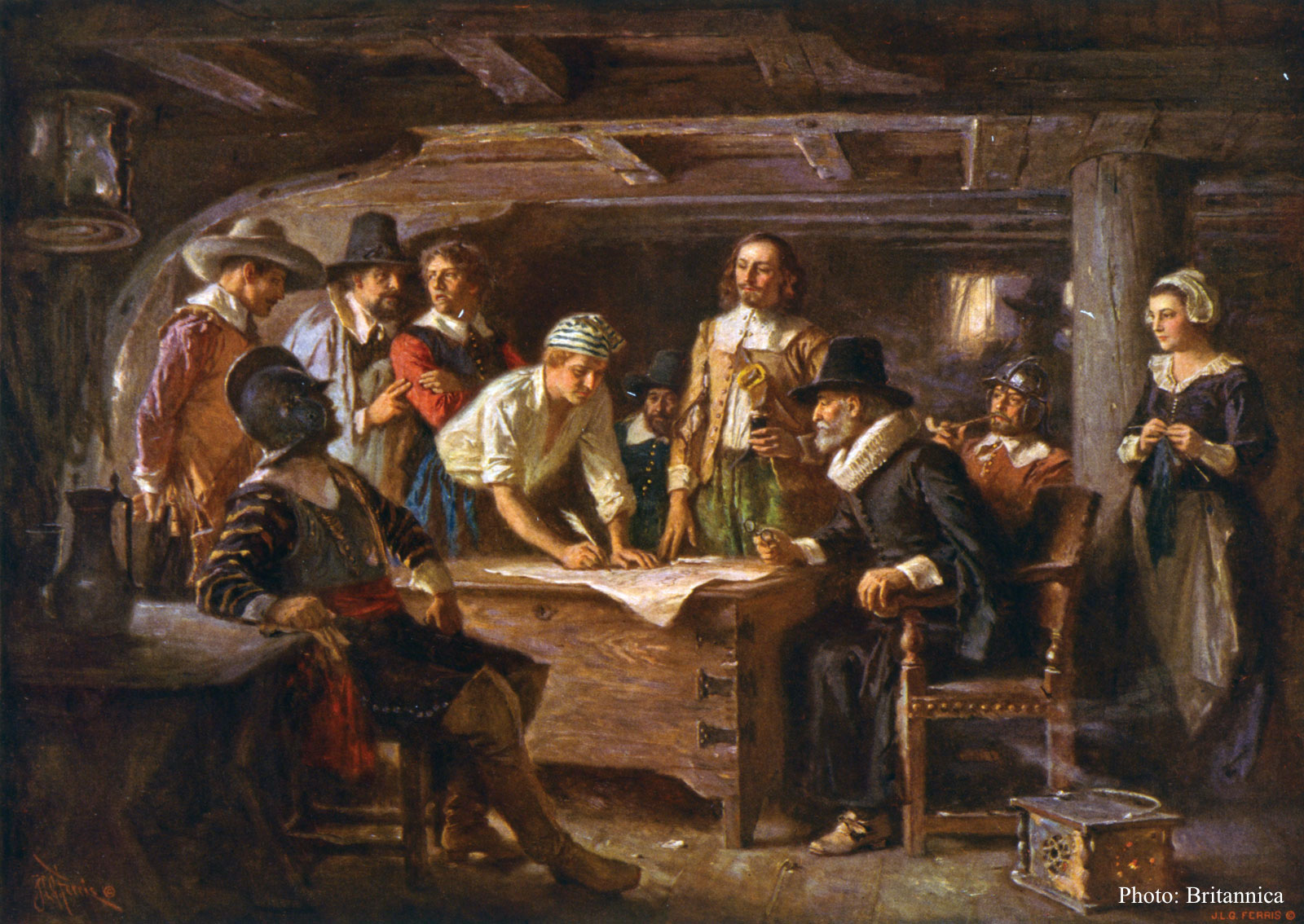
Written by Stan Rasmussen
November 18, 2020
As the first governing document of Plymouth Colony, the compact was also the first written framework of self-government composed and enacted in what is now the United States of America. This is what makes that event so meaningful for us today.
In the early hours of November 19 [O.S. November 9], 1620,* the Mayflower crew sighted land off the coast of what today is Massachusetts. The passengers – the largest group of which were English Separatists, later known as the Pilgrims – expressed gratitude to God for their safe arrival following the arduous ocean crossing to what they hoped would be a better life in the New World.
Before they could begin life in the new land, however, pressing practical issues had to be addressed – challenges arising from the unexpected circumstances they now faced after enduring multiple setbacks. Shortly after their journey began, due to complications the 102 passengers had crowded onto one ship instead of two as planned. This delay, compounded by fierce storms that drove them off course, resulted in an arrival more than a month late and far north of their intended destination in the Colony of Virginia. With provisions running short, the journey ended at Cape Cod.
Because they would not be settling in the agreed-upon territory hundreds of miles to the south, some of the non-Puritan passengers – included in the venture by British sponsors to provide skills for the new colony’s success and referred to as “strangers” – threatened to abandon the effort, asserting that the erroneous landing point nullified their agreement. To prevent the potentially perilous division, the passengers would consider establishing their own government, by means of common consent, while also affirming their allegiance to the Crown of England.

After counseling together about how to resolve the conflicts and pursue their purposes, they committed to cooperate and hold themselves and each other accountable to essential principles and processes.
Signed on November 21 [O.S. November 11], the Mayflower Compact, originally titled “Agreement Between the Settlers of New Plymouth,” was a civil accord wherein the settlers committed to abide by the community’s rules and regulations for the sake of order and survival.
Four hundred and five years earlier (1215), Magna Carta had established the concept of the rule of law, which at the time meant the king’s law. In the Mayflower Compact, the Pilgrims and strangers were pledging loyalty to laws they themselves would establish. As historian Rebecca Fraser described in her book The Mayflower: The Families, the Voyage and the Founding of America, “Plymouth Colony was the first experiment in consensual government in Western history between individuals with one another, and not with a monarch.”
Because the original version of the Mayflower Compact was lost, the oldest source for the text of the document – below – is Mourt’s Relation (1622), an account of the Plymouth settlement written by Edward Winslow and William Bradford, signers of the compact and leaders in the settlement.
In the name of God, Amen. We, whose names are underwritten, the Loyal Subjects of our dread Sovereign Lord King James, by the Grace of God, of Great Britain, France, and Ireland, King, defender of the Faith, etc.:
Having undertaken, for the Glory of God, and advancement of the Christian faith, and the honor of our King and Country, a voyage to plant the first colony in the Northern parts of Virginia; do by these presents, solemnly and mutually, in the presence of God, and one another; covenant and combine ourselves together into a civil body politic; for our better ordering, and preservation and furtherance of the ends aforesaid; and by virtue hereof to enact, constitute, and frame, such just and equal laws, ordinances, acts, constitutions, and offices, from time to time, as shall be thought most meet and convenient for the general good of the colony; unto which we promise all due submission and obedience. In witness whereof we have hereunder subscribed our names; Cape Cod, the 11th of November, in the year of the reign of our sovereign lord King James, of England, France and Ireland eighteenth and of Scotland fifty-fourth, Anno Domini 1620. [Emphasis added.]
“…a civil body politic … for our better ordering … preservation and furtherance … by … enact[ing] … just and equal laws … for the general good…”
This unprecedented civic covenant enabled the intrepid immigrants to survive adversity, manage and leverage their diversity, and pursue prosperity. Rooted in timeless principles, the Mayflower Compact established a prudent map and steadying influence then and provides a model we wisely can follow today.
* November 9, 1620 O.S. (under the “Old Style” or Julian calendar); November 19, 1620, under the “New Style” (N.S.) or Gregorian calendar, currently the near-global standard commonly denoted as A.D. (Anno Domini) or the alternative secular reference C.E. (“Common Era”).
Read More
Ignoring the text of the Constitution is a mistake
A written Constitution is entirely superfluous if the document is simply meant to give the people what they want.
What you need to know about election integrity
It should be easy to vote and hard to cheat. This oft-quoted phrase has been articulated as a guiding principle by many elected officials wading into voting and election policy debates in recent years. So why has this issue been so contentious, and what’s the solution?
How transparent are school districts about curriculum?
Utah districts don’t need to wait for legislation to be transparent – many have sought to be transparent on their own. District leaders interested in this reform can do several things right away.


